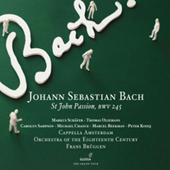
ESSENTIAL RECORDINGS

The fact that the St John Passion, BWV 245 was the earliest of the two
major settings by Johann Sebastian Bach on the liturgical subject of the Passion
of Christ, does not, in my opinion, lessen its quality and impact. I've often wondered as to why the
later St Matthew Passion has become the favored version. It may be more expansive and
contemplative, but it dims when compared to the dramatic intensity and balanced pacing of its younger
sibling. The opening chorus of the St John immediately sets a dramatic tone and lends
the work its human heart. It also clearly displays Bach's genius and sharpened skill at setting the scene
with harmonic tension and rhythmic impetus. Listen to how the choir is strong and unflinching against
the weakening and descending harmonic chromaticism of the orchestra. Another example of Bach's keenly
perceptive mind, is how he portrays Jesus himself as peacefully divine and remotely abstract, from the otherwise
dramatic characters and crowds that want him crucified. It is in religiously lofty works like this one that the
human side and earthiness of this composer are the most exposed.
Within the first thirty seconds into my first audition of this new 'live' recording, I had the knee jerk reaction of
dismissing it right then and there. Conductor Frans Brüggen sets a pace so slow and hesitant,
clocking the opening movement at 10:33, compared to the 8:12 of another very recent release of the same work.
I immediately had the gut reaction that this tempo was simply not right, and that the whole recording was destined
to ruin. Boy was I wrong. As usual, I refrained from immediately making comparisons between recordings. For one
thing, I believe that passing judgement on something by trying to have it measure up to something else is a terrible way
of going about it. I prefer to evaluate and criticise recordings and interpretations on their own merits, rather than
frown on them because another one happens to be more to my liking. And my patience paid off. The more I moved
deeper and deeper into the recording, and the more I kept re-listening (to the opening segment in particular), the more
I realized that Brüggen's reading truly exposed the tragedy beneath the surface of this magnificent work.
The choir in this recording, the Cappella Amsterdam, is always rock solid and more importantly, always sounds as one,
rather than a group of individual voices which is too often the norm these days. Each and every soloist shine in their individual parts, with
certain arias in particular attaining near perfection, as in the Es ist vollbracht! aria sung by alto Michael Chance. And
for a live recording, I must say this is very impressive in its overall impact and depth of field, and also in its clear and balanced capture of
the individual parts. The recording engineers at Glossa seem to have caught every detail without having to spotlight
everything, and the balance between the orchestral instruments, the organ and the voices is well achieved.
Within the liner notes, Anselm Hartinger explains: "A passion service in Bach's time was a cathartic experience
lasting several hours, and the music played an indispensable role in that experience." With an interpretation and recording like this
one in hand, you can easily travel back, with your imagination as your guide of course, and re-create that experience. And what an experience
it must have been for the première musicians under the direction of the Kapellmeister himself.
Jean-Yves Duperron - June 2011